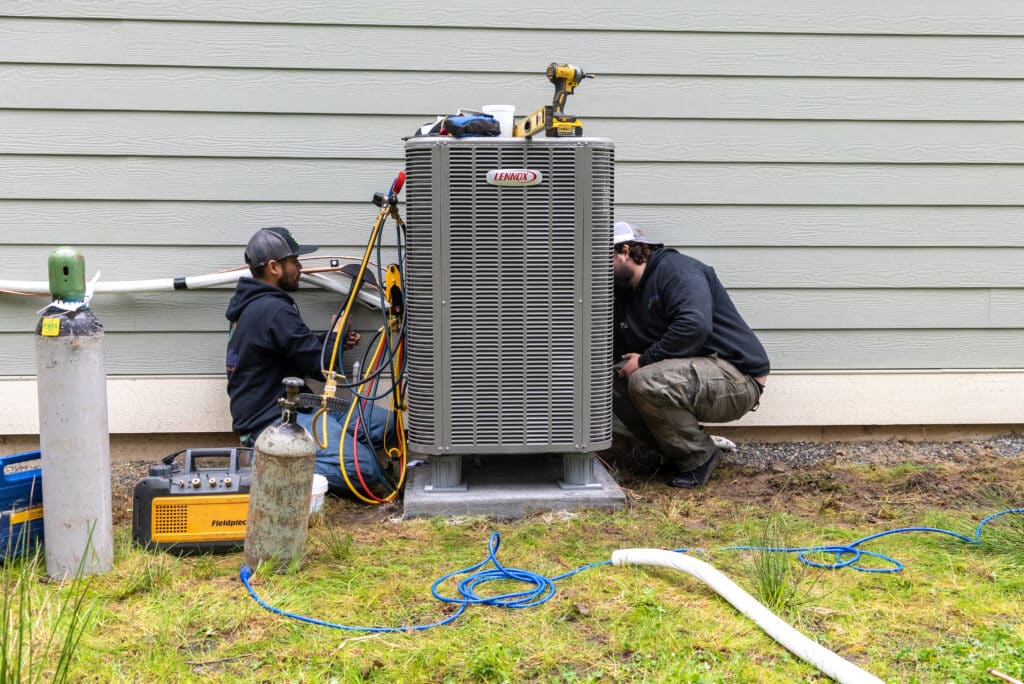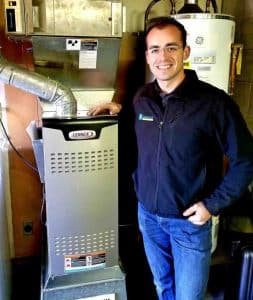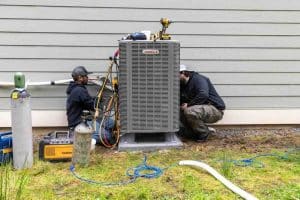Heat pump cleaning is crucial in keeping your home comfortable and energy-efficient. Don’t have time to read the entire article? Here’s a quick breakdown of why heat pump cleaning is essential:
- Efficiency: A clean heat pump runs more efficiently, cooling and heating your home without using extra energy.
- Longevity: Regular cleaning extends the lifespan of your heat pump, saving you the cost of premature replacement.
- Energy Savings: A well-maintained heat pump reduces energy consumption and can lower your utility bills significantly.
Regular maintenance is more than just a task; it’s an investment in your home’s comfort and your wallet’s health.
I’m Colin Matei, the Owner and President of Clean Air Heating & Cooling. With years of experience in HVAC maintenance, I’ve seen how regular heat pump cleaning can prevent costly breakdowns and extend the life of your system.

Why Heat Pump Cleaning is Essential
Heat pump cleaning is crucial for several reasons, including efficiency, longevity, energy savings, air quality, and preventing common problems. Let’s break these down:
Efficiency
A clean heat pump runs more efficiently. When the filters, coils, and other components are free of dust and debris, the unit doesn’t have to work as hard to cool or heat your home.
Longevity
Regular cleaning extends the lifespan of your heat pump. According to Clean Air Heating & Cooling, proper maintenance can add years to your system’s life. This means you won’t have to replace your unit prematurely.
Energy Savings
A well-maintained heat pump consumes less energy. By keeping the system clean, you can lower your utility bills. For instance, regular maintenance can save up to 25% on utility costs.

Air Quality
A dirty heat pump can spread dust, mold, and allergens throughout your home. Cleaning the filters and coils ensures better indoor air quality, making your home healthier.
Common Problems
Lack of maintenance can lead to various issues, including:
- Reduced Efficiency: The system works harder and uses more energy.
- Unpleasant Odors: Mold and mildew can grow in a dirty system.
- Increased Energy Bills: A struggling system consumes more power.
- Shortened Lifespan: The unit wears out faster.
Case Study: A customer in Halifax noticed sawdust in their indoor unit due to construction work. They opted for professional cleaning and avoided long-term damage. This example highlights the importance of regular maintenance, especially in unique situations.
In summary, regular heat pump cleaning is essential for efficiency, longevity, energy savings, air quality, and preventing common problems. Keep your system clean to enjoy a comfortable and healthy home.
Tools and Materials Needed for Heat Pump Cleaning
Before diving into the cleaning process, gather the essential tools and materials. Having the right items on hand will make the job easier and ensure you don’t miss any crucial steps.
Cleaning Solution
A mild detergent mixed with water is suitable for cleaning most heat pump components. You can also purchase specialized cleaning solutions from your local home improvement store. For a more natural option, consider a DIY cleaning solution:
- DIY Cleaning Solution: Mix one cup of vinegar and half a cup of baking soda in a gallon of water. This solution is effective for cleaning air filters, coils, and the drain pan.
Vacuum Cleaner
A vacuum cleaner is indispensable for removing dust and debris from the filters and coils. Use a vacuum with a brush attachment for best results. This will help you get into tight spaces and ensure thorough cleaning.
Soft Brush
A soft brush is useful for scrubbing away stubborn dirt and grime. Be gentle to avoid damaging delicate components like the coils. A toothbrush can also work well for smaller areas.
Gloves
Wear gloves to protect your hands from dirt and cleaning solutions. This also helps you avoid direct contact with any mold or allergens that may be present in the system.
Additional Tools
Depending on the specific needs of your heat pump, you may also require:
- Garden Hose: For cleaning the outdoor unit with low-pressure water.
- No-Rinse Coil Cleaner: Available at HVAC stores, this cleaner is ideal for the coils.
- Fin Comb: Useful for straightening bent cooling fins.
Summary
Having the right tools and materials is crucial for effective heat pump cleaning. A mild detergent, vacuum cleaner, soft brush, and gloves are essential. For a natural cleaning solution, mix vinegar and baking soda with water. Additional tools like a garden hose and no-rinse coil cleaner can also be helpful.

Next, we’ll guide you through the step-by-step process of cleaning your heat pump to ensure it runs efficiently and lasts longer.
Step-by-Step Guide to Cleaning Your Heat Pump
Cleaning the Air Filters
Cleaning the air filters is the first and most crucial step in heat pump cleaning. Clogged filters can restrict airflow and reduce efficiency. Here’s how to do it:
- Turn Off the Power: Safety first. Make sure to turn off the power to the heat pump to avoid any electrical accidents.
- Remove the Air Filter: Locate the air filter, usually behind a grille or cover. Carefully remove it.
- Vacuum Cleaner: Use a vacuum cleaner with a brush attachment to remove dust and debris from the filter.
- Soft Brush and Mild Detergent: For washable filters, gently scrub them with a soft brush and mild detergent mixed with water. Avoid using water above 40˚C.
- Drying: Let the filter dry completely in a shaded area before reinserting it into the unit. Avoid direct sunlight to prevent damage.
Regularly cleaning the air filters ensures your heat pump runs efficiently and maintains good indoor air quality.
Cleaning the Coils
The coils are essential for heat transfer in your heat pump. Dirty coils can reduce efficiency and increase energy consumption. Follow these steps to clean the coils:
- Turn Off the Power: Always start by turning off the power to the unit.
- Locate the Coils: Coils are typically found behind the air filter in the indoor unit and in the outdoor unit.
- Vacuum Cleaner: Use a vacuum cleaner with a brush attachment to remove loose dirt and debris from the coils.
- No-Rinse Coil Cleaner: Apply a no-rinse coil cleaner to the coils. These cleaners are designed to break down dirt and grime without the need for rinsing.
- Soft Brush and Cleaning Solution: For stubborn dirt, gently scrub the coils with a soft brush and a mild cleaning solution (water and detergent or a DIY vinegar solution).
- Drying: Let the coils air dry completely before turning the power back on.
Cleaning the coils ensures efficient heat transfer and helps your heat pump operate smoothly.
Cleaning the Outdoor Unit
The outdoor unit is exposed to the elements and can accumulate debris, which can block airflow and reduce efficiency. Here’s how to clean it:
- Turn Off the Power: Ensure the power is off to avoid any electrical hazards.
- Clear Debris: Remove leaves, dirt, and other debris from around the unit. This helps maintain proper airflow.
- Low-Pressure Water: Use a garden hose with a low-pressure setting to gently wash away dirt and debris from the unit. Avoid using a pressure washer as it can damage the delicate fins.
- Inspect for Damage: Check the outdoor unit for any visible damage or wear. If you notice anything unusual, it might be time to call a professional for a thorough inspection.
Regularly cleaning the outdoor unit keeps your heat pump running efficiently and extends its lifespan.
Next, we’ll discuss the signs that indicate your heat pump needs cleaning.
Signs Your Heat Pump Needs Cleaning
Keeping your heat pump clean is crucial for its efficiency and longevity. But how can you tell when it needs cleaning? Here are some signs to look out for:
Physical Signs
Dirty Air Filters: If you see dust and dirt accumulating on the air filters, it’s time to clean them. Dirty filters can block airflow and reduce efficiency.
Dust Buildup on Fins and Coils: Visible dust on the fins and coils can impede heat transfer, making your heat pump work harder.
Debris in the Drain Pan: A clogged drain pan can lead to water damage and mold growth. Remove any debris you find.
Mold Growth: Mold can compromise air quality and health. If you notice mold on any part of your heat pump, it’s a clear sign that cleaning is overdue.
Performance Signs
Reduced Cooling Efficiency: If your heat pump isn’t cooling as effectively as it used to, dirty components could be the culprit.
Unusual Noises: Strange sounds like grinding, rattling, or hissing can indicate that parts of your heat pump are dirty or malfunctioning. For instance, a former refrigeration tech noted that while regular maintenance might seem like overkill, it can prevent issues like these.
Unpleasant Odors: Bad smells coming from your heat pump could be a sign of mold or other contaminants.
Increased Energy Bills: If your energy bills are higher than usual without a change in usage, your heat pump might be working harder due to dirt and debris. This is a common issue that can be resolved with regular cleaning.
Recognizing these signs early can help you maintain your heat pump’s performance and avoid costly repairs.
Next, let’s explore how often you should clean your heat pump.
How Often Should You Clean Your Heat Pump?
Keeping your heat pump clean is key to its efficiency and longevity. But how often should you do it? Several factors can affect this, including frequency of use, presence of pets, manufacturer recommendations, and seasonal cleaning.
Frequency of Use
More Use Means More Cleaning
If you use your heat pump frequently, especially in hot climates, you’ll need to clean it more often. Regular use can lead to faster buildup of dust and debris, which can reduce efficiency.
Presence of Pets
Pets Can Increase Cleaning Needs
Pet hair and dander can quickly clog filters and reduce your heat pump’s efficiency. If you have pets, especially those that shed a lot, you may need to clean the filters more often—possibly even monthly.
Manufacturer Recommendations
Follow the Manufacturer’s Guidelines
Always check your heat pump’s user manual for specific cleaning guidelines. For instance, Hitachi recommends regular filter checks and annual thorough cleanings of coils and other components. Following these guidelines ensures optimal performance and avoids voiding your warranty.
Seasonal Cleaning
Prepare for Seasonal Changes
As a general rule, perform a thorough cleaning at least once a year. Ideally, do this before the peak heating or cooling seasons. This ensures your heat pump is ready to work efficiently when you need it most.
Special Considerations
Ground Floor Units and Smokers
Households on the ground floor or those with smokers may also need to clean the filters more frequently. Ground floor units are more exposed to dust and debris, while smoking can lead to faster buildup of contaminants.
By considering these factors and setting a regular cleaning schedule, you can keep your heat pump running smoothly and efficiently. Next, let’s look at the difference between DIY and professional heat pump cleaning.
DIY vs Professional Heat Pump Cleaning
When it comes to heat pump cleaning, you have two main options: doing it yourself (DIY) or hiring a professional. Both have their advantages and drawbacks. Let’s break it down.
DIY Tasks
What You Can Do Yourself
- Cleaning Air Filters: Turn off the power, remove the air filter, vacuum or wash it with mild detergent, and let it dry before reinstalling.
- Cleaning Coils: Locate the coils, use a vacuum cleaner or a soft brush, and apply a no-rinse coil cleaner.
- Outdoor Unit Maintenance: Clear debris from around the unit, use a garden hose to wash it down, and inspect for any visible damage.
Tools Needed
- Mild detergent
- Vacuum cleaner
- Soft brush
- Garden hose
- No-rinse coil cleaner
Professional Tasks
What Professionals Handle
- Deep Cleaning: Professionals use specialized equipment to thoroughly clean all components, including hard-to-reach areas.
- System Diagnostics: They can identify and fix issues like refrigerant leaks, electrical failures, and worn-out parts.
- Performance Checks: Technicians ensure your heat pump is running at peak efficiency, which can save you money in the long run.
Why Hire a Pro?
- Expertise: Trained technicians can spot and fix problems that you might miss.
- Safety: Handling refrigerants and electrical components requires specialized knowledge.
- Warranty Compliance: Regular professional maintenance may be required to keep your warranty valid.
Cost Comparison
DIY Costs
- Cleaning Supplies: Around $30 for basic supplies like detergents and brushes.
- Time Investment: A few hours of your time every few months.
Professional Service Costs
- Annual Maintenance: Typically ranges from $100 to $150 per unit.
- Comprehensive Cleaning: More thorough services can cost up to $500, especially if you have multiple units.
Benefits of Professional Service
- Efficiency: Professionals can ensure your heat pump operates at peak efficiency, reducing energy consumption.
- Longevity: Regular professional maintenance can extend the lifespan of your heat pump.
- Peace of Mind: Knowing that your system is in expert hands can save you stress and potential future costs.
By weighing the costs and benefits, you can decide whether to tackle heat pump cleaning yourself or leave it to the pros. Up next, we’ll answer some frequently asked questions about heat pump cleaning.
Frequently Asked Questions about Heat Pump Cleaning
How often should heat pumps be cleaned?
Monthly Cleaning: Regularly clean or replace the air filters every month. This helps maintain airflow and efficiency.
Seasonal Cleaning: At the start and end of major heating or cooling seasons, perform a more thorough cleaning. This includes cleaning the coils and checking the outdoor unit.
Professional Maintenance: Schedule a professional inspection and cleaning at least once a year. This ensures that all components are in good condition and functioning efficiently.
Can you clean your heat pump yourself?
DIY Tasks:
- Air Filters: Turn off the power, remove the air filter, vacuum or wash it with mild detergent, and let it dry before reinstalling.
- Coils: Locate the coils, use a vacuum cleaner or a soft brush, and apply a no-rinse coil cleaner.
- Outdoor Unit: Clear debris from around the unit, use a garden hose to wash it down, and inspect for any visible damage.
Safety Precautions: Always turn off the power before cleaning any components. Use only approved cleaning solutions to avoid damaging the system.
Professional Tasks:
- Deep Cleaning: Professionals use specialized equipment to clean hard-to-reach areas.
- System Diagnostics: Identifying and fixing issues like refrigerant leaks and electrical failures.
- Performance Checks: Ensuring the heat pump runs at peak efficiency.
What is the price for heat pump cleaning?
Cost Range:
- DIY Costs: Basic supplies like detergents and brushes cost around $30. Your time investment is also a factor.
- Professional Service Costs: Annual maintenance typically ranges from $100 to $150 per unit. Comprehensive cleaning services can cost up to $500, especially if you have multiple units.
Professional Service:
- Efficiency: Ensures your heat pump operates efficiently, reducing energy consumption.
- Longevity: Regular professional maintenance can extend the lifespan of your heat pump.
- Peace of Mind: Knowing your system is in expert hands can save you stress and potential future costs.
By understanding these key points, you can make informed decisions about heat pump cleaning and maintenance.
Conclusion
Regular heat pump cleaning is vital for maintaining efficiency, prolonging lifespan, and ensuring optimal air quality in your home. By keeping your heat pump clean, you can avoid increased energy bills and unexpected repair costs.
At Clean Air Heating & Cooling, we understand the importance of maintaining your heat pump. Our professional services ensure that your system runs smoothly and efficiently. We take pride in our customer satisfaction and offer an energy savings guarantee to help you save on utility costs.
By choosing Clean Air Heating & Cooling, you are investing in the longevity and performance of your heat pump. Our team is dedicated to providing top-notch service and ensuring your home remains comfortable all year round.
For more information on our services, including mini-split cleaning, visit our mini-splits service page.
Regular maintenance is key to a healthy and efficient heat pump. Trust Clean Air Heating & Cooling to keep your system in peak condition.





